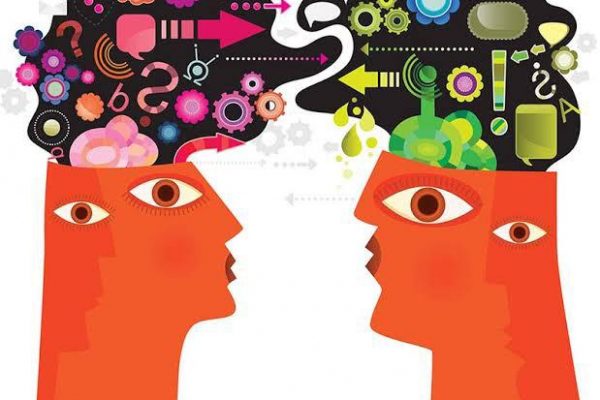- hello.
Nambu Nayake : Hi da, do you know what that means?
- Doesn’t that mean ”hi”?
Nambu Nayake : We also study the word ”hi” separately. That’s how we use Hello, but what’s the real meaning?
- I’m not sure. What do you mean?
Nambu Nayake: Derived from the Arabic word “rahaba”, which means “with refreshment”. So when we say ”Hello“, we are actually wishing ”refreshment” to the one in front of us.
– How nice it is: With refreshment… Are the meanings really that important?
Nambu Nayake : Meanings are very important. It’s as important as the sound. Everything that comes out of your mouth is incredibly important. Because it shapes you and your life.
– How so?
Nambu Nayake: Your brain will hear what is coming out of your mouth, not your ear, first of all… you will say it if it is appropriate, if not, you will shut up.
- According to what is appropriate?
Nambu Nayake : According to the message you want to give to the universe.. According to the wish that you want to embody in your life.. According to how it will affect you when it comes back to you with strength..
– Are our words really that strong?
Nambu Nayake : And how! If you don’t believe me, take a look at the holy books, because most of the known religions already emphasize this.
Take, for example, the Gospel of John first. What does the first sentence say ?
“There was PROMISE in the beginning. The Word was with God, and the Word was God. Everything existed through him, nothing that existed existed without Him.”
And then what does the Holy Qur’an say?
He says ”Kün Fe Yekün“… ”Ol” and it happens…
Look, pay attention: he doesn’t think about being or write about being… he SAYS BE and it happens… So I promise again…
- And what does the science side say?
Nambu Nayake : Is it possible that he said something different? Even those who unfortunately impose the separation of religion and science on humanity are gradually realizing that these two ways actually tell the same things.
Take, for example, the big bang, the so-called ”Big bang”? The theory on which the formation of the universe is based..
– Yes, I know… isn’t it the study that was tested at Cern in Switzerland?
Nambu Nayake : Yes… studies are being done and Cern says: “We have found that what actually makes up the Universe is the SOUND of an explosion.”
- Really?
Nambu Nayake : Exactly.. These scientists, who have deeply investigated the Big Bang, which refers to the formation of the Universe, have found evidence of the sound that occurs during the expansion of the universe that occurs during the explosion. Even the Physicist John G. Cramer not only found evidence of sound, but also created a “sound simulation” of it. If you want to hear a simulation of the sound dec 380,000 years to 760,000 years after the big bang, it’s at this link
– It’s really interesting… but what happened to this sound? How did it disappear?
Nambu Nayake: You must be thinking like this because we can’t hear it now. Sound waves spread further and further during the expansion of the universe. The Universe, which has become increasingly cold and expanding from an extremely hot state, has also allowed sound waves to spread at ever-decreasing frequencies. After a while, the sound waves descended to a frequency that the human ear could not hear. Although this sound continued for a long time, it eventually disappeared, but it left behind sound waves. Although we couldn’t hear the sound, the SOUND WAVES didn’t disappear… They slowed down and their vibrations became more material. Even ”WE” were carrion…
“We are slowed down waves of sound and light…”
We will try to figure it out step by step. And do you know that some Siddhis who do private retreats can still hear the sound of the Universe?
- It’s a great experience… and what’s the sound of the Universe like?
Nambu Nayake: It’s actually a very familiar sound… Do you have a guess?
- What if I asked for a hint?
Nambu Nayake : Should I say the most important voice of Eastern philosophy?
- OM ?
Nambu Nayake : Congratulations… OM…
- Is OM the voice of our universe?
Nambu Nayake: Yes… It also represents God… because God is OM, and OM is God.
- Wait a minute, wait a minute… let’s just stop here for a second, please. How can a sound or a syllable represent God?
Nambu Nayake : It is necessary to understand the OM symbolism well. Is it easy to understand this? If we say it’s easy, it’s easy.
– If it’s easy to say it’s easy, it’s great…
Nambu Nayake : We are talking about the power of words, aren’t we? Whatever you say, it’s… not missing, not too much…
- You’re right. Well, then, can you tell me a little about OM?
Nambu Nayake : I propose to devote another conversation entirely to this. In order to understand the OM symbolism, we need to talk in detail. For now, let’s just talk about the importance and power of the promise. We must move our minds step by step up…
- Can I summarize what I understand? A word or a sound is a very great force related to the Universe and existence, which both religions and science accept…
Nambu Nayake : Right… What else?
– According to what is contained in the books of religion, there is a message that God wants to give to people related to the “power of the word…
Nambu Nayake : That’s a wonderful inference! I wonder what that message could be?
– “Use this power!” could it be?
Nambu Nayake : “USE THIS POWER!” We are going really, really fast, and that makes me very happy. I congratulate you…
- So why use this power? What will happen if we use it? What’s the point?
Nambu Nayake : Wait, we still have time to get there. Now a question arises to you : what does the voice and the word serve for?
- There would be no language for talking… Communicating… without voice and words.. At least the language is spoken… and if it weren’t for the language, I think we would have agreed with the pictures as in the early ages. I mean, with hieroglyphics, but even at that time, people made sounds in the expression of their feelings. Right?
Nambu Nayake : So, how old do you think “language” is?
A tip for you. We come across hieroglyphs in 3300 BC. And the Sumerian Language is about 3000 BC… It’s about the written language… So
Let’s also deepen the topic of symbols WITH symbols in a separate conversation, but it is believed that the spoken language is much older than that.
- And how old is it?
Nambu Nayake : Of course, it is almost impossible to find evidence of this at the moment… Nevertheless, neuroscientists believe that by studying human DNA, the mutation of the Foxp2 gene may have triggered humanity’s transition to colloquial speech. The date of this is also M.He. about 25,000…
- And they were talking like us then?
Nambu Nayake: Although it is believed that they have a highly developed language, we know that they cannot make out some of the sounds that we make today. In the research conducted on fossils, we know that the larynx of ancient people was lower than where ours is now, and therefore we assume that they could not make out some sounds such as “u” and “a”.
Let me repeat the question without distracting the topic :
“The voice and the word serve the language. So what does the language serve for?”

- To communicate with each other…
Nambu Nayake : What else?
– What else can it serve?
Nambu Nayake : For example, can we think… without language to think?
– I don’t know… I never thought about it…
Nambu Nayake : Give it a try…
– It’s really hard… when I think I’m talking in my head…
Nambu Nayake: Then let me open up a little: Language gives us abstract reasoning that we wouldn’t have otherwise. The philosopher Peter Carruthers argues that there is an internal and linguistic way of thinking that transports our thoughts into awareness consciousness.
“Maybe we can think without language, but it is the language itself that makes us realize what we are thinking.”
Language is the pattern of thought, it is the container, it is the vehicle. What embodies thought is language. A thought that is not embodied in language is not a thought. In order for a thought to be a thought, for a thought to have value, it must become a word, that is, it must be spoken. We express our thoughts by pouring them into language patterns, words and sentences, and we can pass them on to others. In addition, words are the linguistic counterparts of beings in the universe. Mankind can understand the existence of beings and movements in the universe only by naming them. The being, which is the equivalent of the word used by the speaker, appears in the listener’s brain only through the ingenuity of the word.
Let us define the universe as the space of being between the last point that human thought can reach and dec. There is a world of being and a world of movement in the universe. Words, on the other hand, are the equivalents of these basic elements in the language. The equivalents of entities in the language are nouns, and the equivalents of movements in the language are verbs. Both the concrete beings that we perceive with our sense organs and the abstract beings and movements that we find through the mind have lexical equivalents in language. It is natural that an existence or movement that has no equivalent in language should not also exist in human thought. “Language is the home of thought.” his word expresses this fact. In other words, it is necessary to have language in order for thought to be able to shelter and exist. Let me continue by noting that the symbolism that best describes it in the past teachings is the symbolism of “Shiva” and “Shakti” in the Vedic teaching. Shiva represents static energy, that is, the realm of being, and Shakti represents kinetic energy, that is, the realm of motion. Just “existing” without action does not support creation.

- Are we going to talk about Shiva and Shakti in the future?
Nambu Nayake : Absolutely… more than once…
Returning to our topic, LEIBNIZ said that language is a “mirror of the mind” and that mind and language are internally related. We know that words are necessary not only for communicating our thoughts to others, but also when thinking about ourselves. We also know that the mind, both when talking to others and when thinking, replaces the object with the word. So, we need to understand that the work of replacing the object with this word makes it easier for the mind to process it; the more functional and clear the words are; the better the mind can process them.
Therefore, we should also be able to see that the fact that the words in the language are clear and clear will mean that the right thoughts and ideas are at the service of the mind. We should realize that the roots of foreign words will be learned by heart if they are not learned well, that learning by heart makes the mind sick and disrupts its functioning; language is a means of telling the mind on the one hand, and on the other hand, it is something that kneads the mind. Do you know that because we find language patterns ready, the logic hidden in them shapes our minds?
– How so?
Nambu Nayake : Let’s give an example.. Where is the subject in English? In the beginning, isn’t it? So, when you say ”I’m going to do something“, the word ” I” in the sense of I is at the very beginning. So, where is that “I” in Turkish?
october It is hidden at the very end and only in the form of an attachment……
Nambu Nayake: So do you expect a difference in the personalities of individuals who learn these two languages as their mother tongue?
English Turkic is a language that is used by many people as a native speaker. – I think I will wait… maybe people who use English as their native language can be more confident and open… or more individual… while in Turkish there is a more veiled communication style and individuality is hidden. Actually, that makes up the culture, doesn’t it?
Nambu Nayake : Exactly so…
In a nutshell, words and writings are representative symbols of our thoughts. More importantly, while our thoughts affect our language, the language we use also affects our consciousness and personality.
– Where did we come from with a ”hello“… And where is the ”voice” in this conversation?
Nambu Nayake : Can there be words without sound? Dec can’t be… there can’t be a language without words… There are 7,000 to 8,000 languages currently spoken in the world. How do we decide which language to study the sounds in the words of?
– I think we’ll choose the oldest language… the language that is considered the mother of all languages… and that’s Sanskrit, right?

Nambu Nayake: Right… Sanskrit is the most natural and pure language that is also accepted today. Although it is considered obsolete and obsolete, did you know that the language that NASA has chosen for artificial intelligence programming is Sanskrit?
- Is this a joke?
Nambu Nayake: No, it’s not… I think you should look into it… we’ll be having long and detailed conversations in Sanskrit and its sounds, but let’s just say that’s it for now?
- Let’s just say… what we talked about in terms of sound, words and language was very useful. Especially when we think that these things affect our consciousness… It means that our brain hears what we say… and we must learn to tell it what we want it to hear… Nambu Nayake : It was a nice summary… Thank you… And shall I make one last addition? It’s not just our brain that hears what we say, it’s the entire Universe. He not only hears it, he makes it happen. Therefore, he said, “Oh my!” we say. It’s called the ear of the Earth, and the Universe is a big EAR in itself… please let’s talk about it with that in mind, okay?




